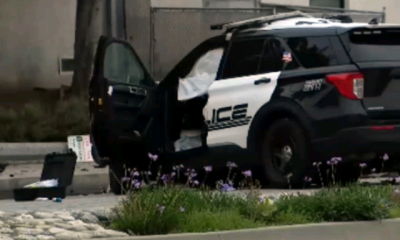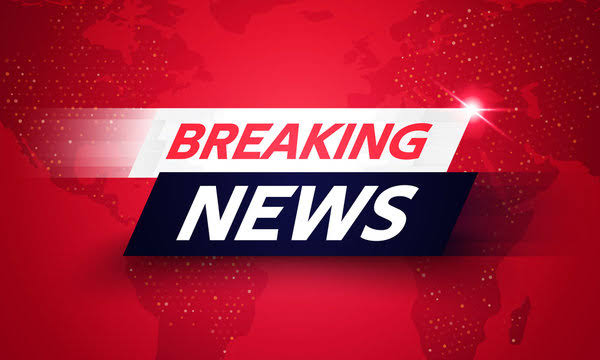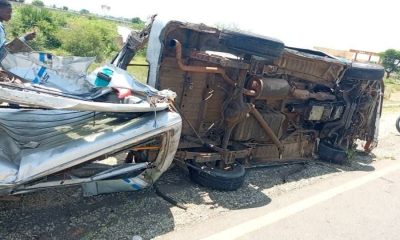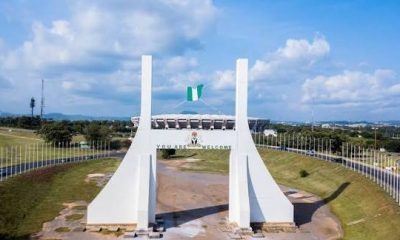Articles
How Fake Drivers, Bribes, and Bureaucracy Endanger Every Road User

A valid driving licence is supposed to represent competence, accountability, and trust behind the wheel. But in Nigeria, that sacred document has become one of the most abused government credentials, bought in backrooms, issued through connections, and often obtained without any driving test.
Also Read: Silent Road Killers: How Unlicensed Drivers Threaten Road Safety
Every day, millions of Nigerians take to the roads with either expired, fake, or illegally obtained licences. The result? Chaos, rising crash rates, and a road culture where anyone, regardless of training feels entitled to drive.
A 2023 report by the Federal Road Safety Corps (FRSC) revealed that nearly 6 in 10 Nigerian drivers do not possess a valid licence, while over 40% of licences in circulation are either fake or unverified. This statistic alone underscores the systemic rot in a process that should be the foundation of road safety.
In this RoadKing.ng investigation, we unpack how the Nigerian licensing system collapsed, why it’s putting millions at risk, and what reforms could finally restore order to the nation’s roads.
The Licensing System: A Noble Idea Gone Rogue
When the Federal Road Safety Corps (FRSC) was established in 1988, one of its key responsibilities was to standardize the licensing of drivers across the country. The goal was clear, ensure that every driver meets a basic level of competence before being allowed to operate a vehicle.
But decades later, that noble idea has been eroded by corruption, bureaucracy, and public indifference. What was once a straightforward process has morphed into a multibillion-naira racket that feeds middlemen, touts, and complicit officials.
“In Nigeria, you don’t learn to drive before getting a licence, you get a licence to learn to drive,” jokes a Lagos taxi driver, but his sarcasm exposes a painful truth.
How the Licensing Process Works (on Paper)
According to FRSC guidelines, the legal process of obtaining a driving licence in Nigeria involves:
- Enrolling in a government-approved driving school and obtaining a certificate of completion.
- Applying online through the official FRSC portal (www.nigeriadriverslicence.org).
- Completing biometric capture at the Vehicle Inspection Office (VIO).
- Undergoing a driving test supervised by VIO officers.
- Making payment (₦10,350 for a 3-year licence or ₦15,450 for 5 years).
- Collecting the licence after verification and approval.
The process should take about 2–3 weeks. But for most Nigerians, it’s never that simple.
Reality Check: The Touts Run the System
At almost every licensing office from Lagos to Kano, a web of touts operates freely, offering “express licences” at inflated prices.
A RoadKing.ng undercover visit to the FRSC office in Gwagwalada, Abuja, revealed how middlemen openly negotiate licence deals for ₦25,000–₦35,000, bypassing driving school, VIO tests, and biometric checks.
“You don’t need to drive, just bring passport photographs,” one tout told our reporter. “We’ll do everything for you inside.”
Within five days, a “valid” licence was produced with authentic FRSC holograms and serial numbers.
These illicit transactions not only enrich corrupt officials but also unleash untrained drivers onto Nigeria’s already chaotic roads.
The Deadly Consequences of Fake and Unqualified Drivers
1. Rising Road Fatalities
Data from the National Bureau of Statistics (NBS) show that Nigeria records over 40,000 road crashes annually, resulting in more than 5,000 deaths, one of the highest in Africa.
Experts estimate that over 60% of these crashes involve drivers without formal training or valid licences.
In 2023, a commercial bus travelling from Ibadan to Abuja plunged into a ditch near Ogbomosho, killing 11 passengers. FRSC reports later confirmed the driver had no driving school certificate and his licence number was fake.
2. Insurance Fraud and Liability Loopholes
Under Nigerian law, an invalid or fake licence automatically nullifies any motor insurance claim. Victims of accidents caused by unlicensed drivers often receive no compensation.
3. Erosion of Road Discipline
When a licensing system loses integrity, it sets the tone for widespread lawlessness. Drivers feel no moral or legal responsibility since they never went through real tests. This fuels speeding, dangerous overtaking, and disregard for traffic laws.
Inside the Corruption Network
RoadKing.ng’s multi-state investigation uncovered how the rot extends beyond street-level touts.
At many licensing centers, corrupt staff collude with external agents. Payments made for fake licences often circulate through internal staff who use authentic FRSC templates to produce counterfeit cards.
In Lagos, a whistleblower at the Ikeja licensing center revealed that daily “returns” from fake licence brokers exceed ₦2 million.
“Everyone knows it’s happening,” he confessed anonymously. “Some officers even prefer working with agents because they earn commission per card processed.”
The Bureaucratic Bottleneck
Even when citizens attempt to follow due process, they encounter endless frustrations, long queues, server downtime, missing data, and delayed card production.
Applicants often wait 2–3 months for collection, while others are told their data “could not be found” due to system errors. These inefficiencies drive more people into the arms of touts who promise speed and convenience.
“It’s not that Nigerians don’t want to follow the law,” said Mrs. Grace Abubakar, a driving school instructor in Kaduna. “The system frustrates them. That’s why they prefer shortcuts.”
FRSC’s Struggle Against Fraud
The FRSC insists it is aware of the challenge and has taken steps to curb the menace.
In 2023, the Corps launched an online verification portal where individuals and law enforcement can confirm the authenticity of any licence using the licence number or National Identification Number (NIN).
The FRSC also introduced QR-coded licences and digital biometric validation to close loopholes.
However, these innovations face limited enforcement. Most traffic officers on the road do not use the verification system during checks, allowing fake licences to pass undetected.
The Role of Driving Schools: Broken or Bypassed?
Nigeria has over 1,200 approved driving schools, according to FRSC data. But many exist only on paper. Some issue certificates without training, while others use outdated vehicles and lack certified instructors.
A 2022 Road Safety Review Committee report revealed that only 27% of driving schools nationwide meet the minimum operational standard.
Without quality training institutions, the entire licensing ecosystem collapses — because competence can’t be certified by paperwork alone.
Comparative Analysis: How Other Countries Do It
In South Africa, obtaining a licence involves a rigorous multi-stage testing system: written exams, vision checks, and supervised road tests. Failure rates are high, but it ensures competence.
In the United Kingdom, drivers must pass a theory test (covering highway codes and hazard perception) and a practical test. Licences are centrally tracked and revocable upon infractions.
Nigeria’s process, by contrast, remains largely manual, prone to forgery, and dependent on human discretion — the perfect breeding ground for corruption.
Technology Can Save the System
To fix the mess, Nigeria must embrace automation and transparency.
- Centralized Biometric Integration: Link all licences to NIN and BVN to prevent duplication or forgery.
- AI-Driven Verification: Deploy mobile scanners for FRSC patrols to instantly verify licence validity.
- Cashless Processing: Eliminate physical cash payments; enforce online payment only to reduce bribery.
- Public Access Portal: Allow employers, insurance firms, and police to verify driver credentials.
- Digital Driving School Records: Mandate driving schools to upload real-time test results to the FRSC database.
The Human Cost of Inaction
Behind every fake licence is a potential killer on the road.
In February 2023, a fuel tanker driver in Ogun State with no formal training lost control on Sagamu Road, causing an explosion that killed 18 people. The FRSC confirmed that the driver had obtained his licence “through a friend” for ₦20,000.
When systems fail to screen drivers, every innocent road user becomes a victim of negligence.
Voices from the Road
“My brother died in an accident caused by a driver who could not even use side mirrors,” said Ngozi Opara, a grieving sister from Owerri.
“When police checked, his licence was fake. But nobody was punished.”
“We see drivers who can’t read road signs or reverse properly,” added FRSC Commander Samuel Oyeyemi. “That’s why crashes are increasing. Licensing must mean something again.”
Policy Recommendations
- Total Overhaul of the Licensing Framework:
Merge FRSC, VIO, and Motor Registry functions into a unified digital authority. - Severe Penalties for Fake Licence Holders:
Impose mandatory 6-month jail terms and ₦500,000 fines for both buyers and issuing agents. - Mandatory Recertification:
Every 5 years, drivers must undergo short refresher safety courses before licence renewal. - Driving School Accreditation Review:
De-register non-compliant schools and establish a national instructor certification system. - Public Whistleblower Hotline:
Create an anonymous portal where citizens can report fraudulent agents.
Conclusion
The crisis of Nigeria’s driving licence system is not just about corruption, it’s about national safety.
Each fake licence is a death sentence waiting to happen, each bribe undermines public trust, and each untrained driver represents another preventable tragedy.
To make Nigeria’s roads safer, the government must rebuild the licensing system from the ground up driven by integrity, technology, and accountability.
Until that happens, every road trip in Nigeria remains a gamble with fate.























